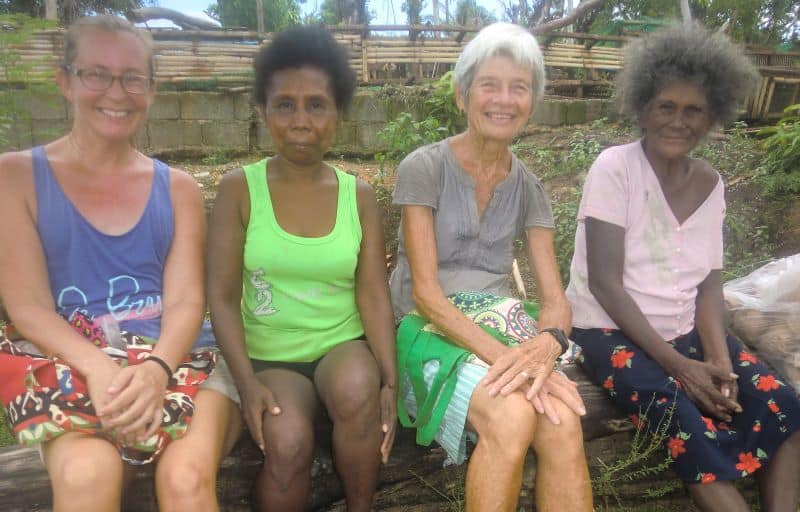Last Updated on October 27, 2024 by Ellen
There is a lot of speculation about future travel and tourism in the days beyond the coronavirus pandemic. There’s also the ongoing, never-ending debate about “a traveler versus a tourist” and which one is better and why.
As I write this, I’m living in a two-bedroom apartment rental in a semi-rural area (by American standards) named Malay, Aklan, on Panay Island in the Philippines. Right now, roosters are crowing, the sun is rising, the water is calm, fishermen area heading back to shore with the first catch of the day. Last night at low tide, local Filipinos dug for sea creatures in tide pools. Those shelled snails and crabs make a good stew.
From our balcony, I can see the White Beach of Boracay. That beach is arguably the most visited beach in this country. I keep seeing ads on my Facebook newsfeed about food delivery from “nice” restaurants that used to be frequented by an endless stream of tourists — until they stopped coming. I also see advertisements for the sale of hotels and other properties, and I can’t help but wonder if those same offers of sales ran during the boom times of tourism.
I’ve just written two paragraphs that demonstrate difference between travel, and tourism. The topic is a source of contention among some people in the travel “industry.”
Future travel and tourism
With travel, you get to see the authentic way people live in the area you visit. With tourism, you see a glamorized version of life in the same region or country.
Tourism
Tourist hot spots cater to the person who flies in for a short amount of time on “vacation” from the regular 9-to-5 job and needs to blow off steam. That vacationer doesn’t usually take the time to figure out local travel methods, decipher foreign menus, learn a few words in the local language. Their money goes to buying a quick experience that is set up for them: get in, have fun for a week, get out – and get back to your ‘regular’ life.
There is nothing wrong with vacations and tourism. I’m not a travel elitist. Tourism supports entire communities. The township of Malay – where I am staying – includes Boracay Island across the channel. What happens there, impacts what happens here. And people here are hurting with no tourism overflow from Boracay, just as they are hurting on Boracay Island itself.
Also, I developed a desire for travel after my first experience beyond the all-inclusive vacation resort in Cancun. I did not start as a ‘traveler’ — I started as a ‘tourist.’ If tourism opens your mind, and travel grows your spirit, isn’t that a beautiful thing?
Travel
Travel is different. We call it “slow travel” to differentiate from “tourism” – but it’s really simply just travel. The goal (at least for me) is to enjoy getting there, leisurely explore and discover over longer than a week, leave with a measure of inner growth, and keep going to the next place – because that is your regular life.
Our readers know we usually stay somewhere about a month or more. But there have been times when we “play tourist” in order to see popular, pricey, touristy locations. In those instances, like a week in Rome, or several days in Marrakesh, we still look for budget-friendly ways to save money. And we still look for ways to authentically interact with locals.
Read: Is an endless travel itinerary the lifestyle for you?
‘Slow’ Travel
This year we’ve made a special discovery thanks to the coronavirus pandemic. We slowed down even more. We are on a three-month-plus travel pause. And because of that, we are able to help the community in ways we could not do if we had left after one month.
My husband is carrying cinder blocks up a mountainside and organizing a rebuilding project to help an indigenous tribe because he’s here long enough to do that. (Plus, he has a generous and kind heart!)
Often on our travels, we look for ways to give back to communities and volunteer. We once spent a month at a refugee camp in Greece (and I would go back in a heartbeat); I have visited people in Philippine prison to talk about addiction over six weeks; we have fed hungry people.
But maybe the most important time is spent by simply talking with and befriending locals — because we want to experience a taste of what their lives are like. And up to this point, most people around the world still had a fascination with Americans, so they like to learn about us. Give and take. Share. Experience. Exchange. Grow.
Educated guesses on future travel and tourism
So what about the post-pandemic travel and tourist scene? I started by mentioning all the speculation about the bleak future of tourism. Of course no one knows for certain, but we can make educated guesses. Here are a few of my guesses on the new tourism.
- Fewer flights will likely mean higher prices
- Tourism businesses will go bankrupt because of a slow recovery
- The tourism “industry” will focus on ‘travelers’ with means (the executive vacation instead of the average family vacation). If there’s an upside to this – it’s that it would help ease the ‘overtourism’ that destroyed the authenticity of some destinations, and hurt the environment.
- Countries with low virus levels likely will require quarantines (which would cut down the ‘get in, have fun, get out’ vacation tourism)
- Some countries might require travel health insurance — or even specific bank account funds to obtain a visa
- Visa issuance will generally be more difficult for Americans
I have guesses about, and am hopeful on future travel.
- Fewer flights mean more regional travel, as we practice “slow travel” with boats, buses, trains, and only occasional flights
- Locals will be more eager to exchange authentic time with travelers
- A smaller tourism “industry” could lead to more locally sustained businesses (after some undoubtedly hard growing pains).
- Perhaps visa issuance will be more favorable for longer-stays, which would help to cover quarantine time, as opposed to ‘get in, have fun, get out’ vacations. After all, travelers agree: we travel to mix with people.
- All travelers (including traditional ‘tourists’) will hopefully realize cultural visits and exchanges enrich your life — that you can experience authentic interaction with locals as a learning and growth opportunity.
That last hopeful future travel point is important to me. I believe many Americans need to break the “I, me, and mine” mentality if we are going to have a better post-pandemic world.
Thanks for reading, “Future travel and tourism beyond the coronavirus pandemic.”

Earth Vagabonds advocate for travel when borders reopen. Until then, we are helping the indigenous Ati tribe rebuild some infrastructure damaged in the last major typhoon on Christmas Day 2019.

